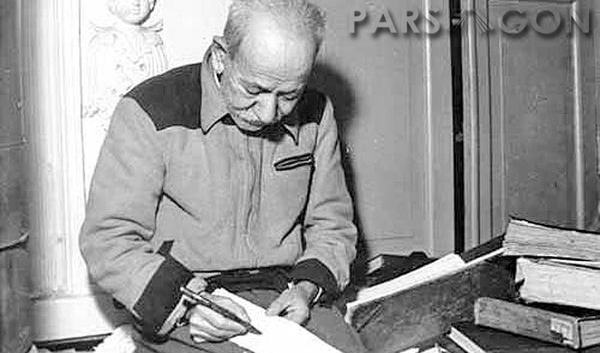
Today (February 26) coincides with the 60th death anniversary of the great author of the Persian Encyclopedia.
Ali Akbar Dehkhoda was born in Tehran, 1879. His father, Khan Baba Khan Qazvini, died when his son was only nine years old. Dehkhoda studied theology, Islamic law and literature under the tutelage of Shaykh Qolam-Hossein Boroujerdi. In December 1899, Dehkhoda enrolled in the School of Political Science (in Persian: Madreseh-e Oloom-e Siassi), and after completing his studies, he was retained as a secretary by the Ghajar dignitary and ambassador to Balkan countries, and studied for the next two years, primarily in Vienna, Austria. In these years he completed his French language. Dehkhoda’s return to Iran, in 1905, coincided with the Iranian Constitutional Revolution and he soon became an important participant in that movement. His literary and commentary work began with his collaboration with Sur-Esrafil newspaper, founded by Mirza Jahangir Khan Shirazi, known as Sur-Esrafil, and Qasem Khan Tabrizi.
Dehkhoda wrote a satirical political column titled “Hocus-Pocus” (Charand-o-Parand) under the pseudonym Dakho which became quite popular and controversial. Sur Esrafil was a popular newspaper of the time. With the bombardment of the Iranian Parliament by Mohammad Ali Shah, Dehkhoda was arrested and forced into exile since he was one of the members of liberation movement, while his friend and collaborator, Sur Esrafil, was executed by Shah’s agents. In exile, first in Paris and then Switzerland, Dehkhoda with the aid of other Iranian exiles in Paris published Sur-Esrafil. The Sur-Esrafil publishing Center had become a place for the Iranian gatherings and the newspaper was distributed all over the world.
The Dehkhoda Dictionary
The highly significant Dehkhoda Dictionary or ‘Logatnameh- Dehkhoda’ was first printed in 1931. It comprises of 40 volumes and is the largest comprehensive Persian dictionary ever published. The complete work entails over 45 years of work by Dehkhoda, and a cadre of other experts. This book contains different words with their meanings and historical and geographical information. More than thousands of Turkish, Arabic, Indian, German, French, English, Russian words used in Persian language are found in this book. Persian grammar is another advantage of the book since it has been described completely.
Ali Akbar Dehkhoda’s journalistic and satirical prose – for example, in “Hocus Pocus” (Charand-o-Parand) and “Engagé” (politically concerned) verse (collected in his Divan) – influenced later writers of Persian literature.
Dehkhoda passed away on March 9, 1956 and was buried in Ebn-e Babooyeh cemetery in Shahr-e Ray, near Tehran.
The Dehkhoda Dictionary: A Gem For Donation
The Center for Iranian Studies at SOAS, University of London has recently received a rare and celebrated collection of Persian literature, including the 1970 edition of the Dehkhoda Dictionary, from the private collection of an Iranian entrepreneur Mr Harun Rashid Farmanfarmaian (read more here)
Upon the significance and value of the collection, Iranian Heritage Foundation Visiting Scholar, Dr Ghoncheh Tazmini, who was involved in the donation, said:
“The Dehkhoda Dictionary became so significant that in 1945 a bill was proposed in the Iranian Parliament (Majles), signed by numerous Members of Parliament, including Mohammed Mossadegh, to allocate a special budget and staff to complete the project. As a result, offices were provided for the dictionary inside the compounds of the Majles itself. The project was later moved to University of Tehran College of Humanities, where the Dehkhoda Institute was founded, and where it remains until this day.”

Leave a Reply